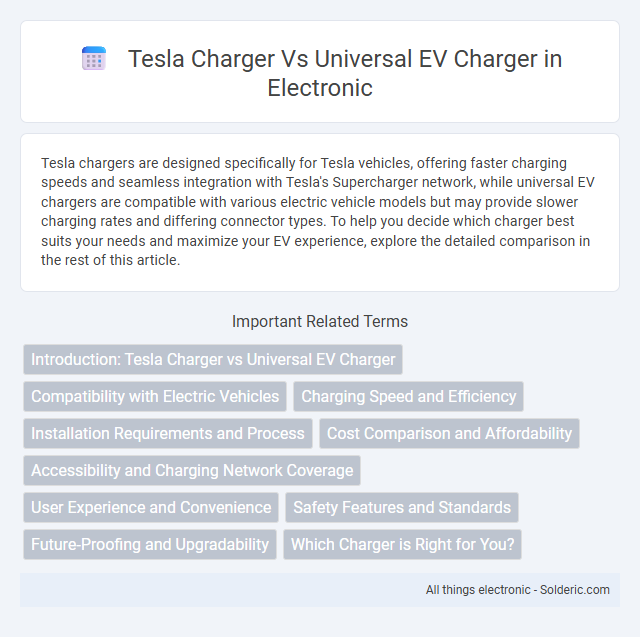Tesla chargers are designed specifically for Tesla vehicles, offering faster charging speeds and seamless integration with Tesla's Supercharger network, while universal EV chargers are compatible with various electric vehicle models but may provide slower charging rates and differing connector types. To help you decide which charger best suits your needs and maximize your EV experience, explore the detailed comparison in the rest of this article.
Comparison Table
| Feature | Tesla Charger | Universal EV Charger |
|---|---|---|
| Compatibility | Exclusive to Tesla vehicles | Supports multiple EV brands and models |
| Connector Type | Tesla proprietary connector (North America) | Standard connectors: CCS, CHAdeMO, Type 2 |
| Charging Speed | Up to 250 kW (Tesla Supercharger V3) | Varies; typically up to 350 kW for fast chargers |
| Installation | Wall connector, easy Tesla integration | Varied installation; depends on brand and type |
| Mobile App Integration | Tesla app with real-time monitoring | Depends on manufacturer; many offer apps |
| Cost | Higher initial cost, optimized for Tesla | Varies widely; competitive pricing available |
| Network Access | Exclusive Tesla Supercharger network | Access to multiple public charging networks |
Introduction: Tesla Charger vs Universal EV Charger
Tesla chargers offer proprietary Superchargers designed specifically for Tesla vehicles, providing faster charging speeds and seamless integration with Tesla's navigation system. Universal EV chargers support a wide range of electric vehicles from various manufacturers, featuring compatibility with multiple connector types such as CCS and CHAdeMO. While Tesla chargers excel in optimized performance for Tesla owners, universal chargers offer greater versatility for diverse EV models.
Compatibility with Electric Vehicles
Tesla chargers are specifically designed for Tesla electric vehicles, providing optimized charging speeds and seamless integration with Tesla's proprietary connector. Universal EV chargers, on the other hand, support a wide range of electric vehicle brands with standardized connectors like CCS and CHAdeMO, offering broader compatibility but potentially slower charge rates for some EV models. Your choice depends on whether you prioritize brand-specific efficiency or versatile charging options for multiple EVs.
Charging Speed and Efficiency
Tesla chargers, particularly the Supercharger V3, deliver peak charging speeds up to 250 kW, enabling rapid battery replenishment in approximately 15-30 minutes. Universal EV chargers, such as those supporting CCS or CHAdeMO standards, typically offer charging speeds ranging from 50 kW to 150 kW, resulting in longer charging durations. Tesla's dedicated charging network and optimized battery communication protocols enhance charging efficiency and reduce energy loss compared to most universal EV chargers.
Installation Requirements and Process
Tesla chargers typically require a dedicated circuit breaker and must be installed near a Tesla vehicle's parking area, often necessitating professional installation to ensure compliance with Tesla-specific wiring standards. Universal EV chargers offer more flexible installation options, compatible with a wider range of electrical infrastructures and EV models, often supporting standard plugs like SAE J1772. Installation complexity and costs vary, with Tesla chargers generally demanding a more tailored setup, whereas universal chargers may be simpler to install in existing electrical systems.
Cost Comparison and Affordability
Tesla chargers typically have higher upfront costs, reflecting their proprietary technology and faster charging speeds. Universal EV chargers offer a more affordable option due to compatibility with various electric vehicle models, often resulting in lower installation and equipment expenses. You can save on expenses by choosing a universal charger if budget constraints are a priority.
Accessibility and Charging Network Coverage
Tesla chargers offer seamless integration with Tesla vehicles and benefit from the extensive Tesla Supercharger network, providing high-speed charging and widespread coverage in key markets across North America, Europe, and Asia. Universal EV chargers support a broad range of electric vehicles from multiple manufacturers, enhancing accessibility for various models and offering compatibility with numerous public charging networks, including CHAdeMO and CCS connectors. While Tesla's proprietary system ensures optimal performance for Tesla owners, universal chargers deliver greater flexibility and accessibility for drivers using different EV brands, especially in regions with diverse charging infrastructures.
User Experience and Convenience
Tesla chargers offer seamless integration with Tesla vehicles, providing faster charging speeds and optimized compatibility that enhance your overall user experience. Universal EV chargers support multiple brands but may require adapter purchases and manual settings, which can complicate convenience for daily use. Choosing a Tesla charger ensures streamlined convenience with minimal setup, while universal chargers provide flexibility across various electric vehicle models.
Safety Features and Standards
Tesla chargers incorporate proprietary safety features such as automated shutoff, temperature monitoring, and built-in ground fault circuit interrupters (GFCIs) to prevent electrical hazards. Universal EV chargers follow industry-wide standards like UL certification and SAE J1772 compliance, ensuring compatibility and safety across multiple electric vehicle brands. Both charger types prioritize user protection through rigorous testing and advanced fault detection systems to minimize risks of overheating, short circuits, and electrical shocks.
Future-Proofing and Upgradability
Tesla chargers boast proprietary technology optimized for Tesla vehicles, but their closed ecosystem limits compatibility with non-Tesla models. Universal EV chargers support multiple brands, offering broader compatibility and firmware updates to accommodate evolving charging standards, making them more adaptable to future vehicle technologies. Investing in a universal charger provides greater future-proofing by ensuring seamless integration as EV technology advances and new models emerge.
Which Charger is Right for You?
Tesla chargers offer fast, reliable charging specifically designed for Tesla vehicles, providing seamless integration with the Tesla Supercharger network and optimized charging speeds. Universal EV chargers support multiple electric vehicle brands, making them versatile for owners with different or future EV models, though charging speeds may vary depending on the vehicle's compatibility. Your choice depends on whether you prioritize Tesla-specific performance and features or the flexibility to charge various EV brands at home.
Tesla charger vs universal EV charger Infographic

 solderic.com
solderic.com